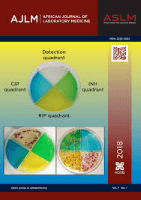
African Journal of Laboratory Medicine
Scope & Guideline
Fostering knowledge for impactful health solutions.
Introduction
Aims and Scopes
- Diagnostic Innovation and Technology:
The journal publishes studies that explore new diagnostic technologies and methodologies, including molecular diagnostics, automation in laboratory settings, and innovative testing approaches. - Antimicrobial Resistance Surveillance:
A significant focus on research related to antimicrobial resistance (AMR), including surveillance studies, resistance patterns, and the implementation of AMR management strategies in clinical settings. - Public Health and Epidemiology:
The journal emphasizes research that links laboratory findings to public health implications, including studies on infectious disease outbreaks, vaccine efficacy, and the effectiveness of public health interventions. - Laboratory Quality Management:
Research addressing laboratory accreditation, quality control processes, and the implementation of best practices in laboratory medicine, particularly in low-resource settings. - Health Policy and Systems Strengthening:
Papers often discuss the integration of laboratory services within broader health systems, highlighting challenges and opportunities for improving health service delivery.
Trending and Emerging
- Impact of COVID-19:
Research addressing the impact of COVID-19 on laboratory practices, diagnostics, and health outcomes is increasingly prominent, showing the pandemic's influence on laboratory medicine priorities. - Integration of Artificial Intelligence and Digital Health:
There is a rising interest in the application of digital health technologies and artificial intelligence in laboratory settings, highlighting opportunities for improving diagnostic accuracy and efficiency. - Molecular Diagnostics and Genomics:
An increasing number of studies focus on molecular diagnostics and genomic analysis, reflecting advancements in technology and the need for precise diagnostic tools in managing infectious diseases. - Laboratory Capacity Building in Low-Income Countries:
Emerging themes include the strengthening of laboratory capacity and infrastructure in low- and middle-income countries, aiming to enhance diagnostic capabilities and public health outcomes. - Community-Based Testing Initiatives:
Research on community-based testing approaches is gaining traction, emphasizing the importance of accessible diagnostics and equity in healthcare delivery.
Declining or Waning
- Traditional Diagnostic Methods:
There appears to be a decline in research focused solely on traditional diagnostic techniques, as the emphasis shifts towards more advanced and automated diagnostic technologies. - General Laboratory Practices:
Research detailing general laboratory practices without a specific focus on innovation or improvement has become less prominent, suggesting a trend towards more specialized studies. - Non-Communicable Diseases (NCDs):
While still relevant, the focus on non-communicable diseases has waned, possibly due to a growing emphasis on infectious diseases and public health challenges, particularly in the context of recent global health crises.
Similar Journals

ANNALES DE BIOLOGIE CLINIQUE
Fostering Collaboration in Clinical and Laboratory ScienceANNALES DE BIOLOGIE CLINIQUE is a prominent French journal dedicated to advancing the fields of Biochemistry, Genetics, Molecular Biology, Immunology, and Microbiology. Published by JOHN LIBBEY EUROTEXT LTD, this journal has been a pivotal resource since its inception in 1945, offering a rich archive of original research, reviews, and clinical studies that aim to bridge the gap between laboratory findings and clinical applications. Despite its ranking in the Q4 quartile within several scientific categories according to the 2023 Scopus rankings—positioning it at #395/636 in General Medicine and #198/221 in General Biochemistry—ANNALES DE BIOLOGIE CLINIQUE serves as a vital platform for emerging researchers and seasoned professionals alike, fostering collaboration and innovation in these vital areas of health science. As an essential tool for researchers and scholars, the journal does not currently provide open access; however, it continuously strives to enhance its impact and visibility in the scientific community through rigorous peer-reviewed content and educational contributions.

CRITICAL REVIEWS IN CLINICAL LABORATORY SCIENCES
Illuminating Pathways in Clinical Laboratory InnovationCRITICAL REVIEWS IN CLINICAL LABORATORY SCIENCES, published by Taylor & Francis Ltd, stands as a premier journal in the field of clinical laboratory science, addressing pivotal advancements and challenges since its inception in 1970. With a commendable impact factor derived from its ranking in Q1 categories across multiple disciplines—including Biochemistry, Genetics and Molecular Biology, and Clinical Biochemistry—this journal is a critical resource for researchers, clinicians, and educators aiming to deepen their understanding and application of laboratory science. The journal's rigorous peer-review process ensures that only the highest quality research is published, providing a platform for profound discussions that influence laboratory practices globally. Although not an open-access journal, it offers various subscription options to facilitate access to its wealth of knowledge. Operating out of Abingdon, England, CRITICAL REVIEWS IN CLINICAL LABORATORY SCIENCES continues to shape the future of clinical biochemistry and laboratory research through its insightful articles, systematic reviews, and expert commentaries, making it an essential read for professionals eager to stay at the forefront of their field.
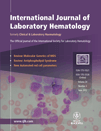
International Journal of Laboratory Hematology
Advancing the science of hematology through innovative research.The International Journal of Laboratory Hematology, published by WILEY, serves as a vital resource in the field of hematology, delivering high-quality research findings and innovations within laboratory practices since its inception in 2007. This journal, accessible under Open Access options, showcases cutting-edge studies that span critical aspects of biochemistry and clinical laboratory methodologies. With a notable impact factor reflected in its Q2 and Q3 rankings across various categories—such as Biochemistry (medical) and Hematology—this journal stands out within the Scopus rankings, positioning itself within the 60th and 59th percentiles of its respective fields. Situated in the United Kingdom, the journal's objectives lie in disseminating pivotal research that enhances our understanding of hematological disorders and laboratory techniques, making it an essential tool for researchers, professionals, and students alike who are committed to advancing the science of laboratory hematology and its applications.

New Microbiologica
Driving impactful research for a healthier tomorrow.New Microbiologica is a prominent academic journal published by EDIZIONI INT SRL, dedicated to advancing knowledge in the fields of Microbiology and Medicine. Since its inception in 1993, this journal has played a vital role in disseminating cutting-edge research, featuring articles that explore the intricate relationships between microorganisms and human health. With an H-index indicating a robust citation profile and a respectable 2023 Scopus Ranking placing it in the 32nd percentile for medicine microbiology, New Microbiologica resonates well within the academic community. Although not an Open Access journal, it is strategically positioned in Quartile 3 of both Medicine (miscellaneous) and Medical Microbiology categories, which reflects its importance to researchers and professionals seeking valuable insights in their fields. Published in Italy, the journal continues to provide a platform for impactful research through its commitment to high-quality publications, fostering collaboration and innovation among scientists and academics in the ever-evolving landscape of microbiological studies.

Infectious Diseases and Clinical Microbiology
Exploring the frontiers of microbiological science and health.Infectious Diseases and Clinical Microbiology is a pivotal journal dedicated to advancing our understanding of infectious diseases through rigorous scientific research and clinical practices. Published by DOC DESIGN INFORMATICS CO LTD, this journal serves as a vital platform for researchers, healthcare professionals, and students keen on enhancing their knowledge of microbiological sciences and the clinical implications of infectious agents. With an ISSN of 2667-646X, it aims to disseminate significant findings in the field, enriching the scholarly dialogue surrounding infectious diseases. While currently operating under a traditional access model, the journal encourages global collaboration and knowledge sharing, striving to make a meaningful impact in tackling the challenges posed by infectious diseases. Its content aims to bridge the gap between laboratory research and clinical application, making it an essential resource in the contemporary landscape of global health.

International Journal of Biomedicine
Connecting researchers to shape the future of biomedicine.International Journal of Biomedicine, published by INT MEDICAL RESEARCH & DEVELOPMENT CORP, is a premier Open Access journal dedicated to advancing knowledge in the multifaceted fields of biomedicine, including but not limited to biochemistry, genetics, immunology, microbiology, and neuroscience. With its ISSN 2158-0510 and E-ISSN 2158-0529, this journal has been serving as a significant platform for researchers since its inception in 2011, ensuring the dissemination of high-quality, peer-reviewed articles. Despite currently holding a Q4 ranking in prominent categories such as Biochemistry, Genetics and Molecular Biology and Neuroscience, the journal plays a vital role in fostering scientific dialogue and innovation in these rapidly evolving domains. The journal's commitment to accessibility further empowers both seasoned professionals and budding scholars to contribute to, and benefit from, the wealth of research that characterizes the biomedicine landscape. With a significant emphasis on interdisciplinary approaches and contemporary issues, the International Journal of Biomedicine is an essential resource for those aiming to navigate the complex intersections of health, disease, and biomedical discovery.
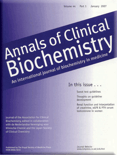
ANNALS OF CLINICAL BIOCHEMISTRY
Transforming Research into Clinical Practice.The Annals of Clinical Biochemistry, published by SAGE Publications Inc, is a prestigious journal that has been pivotal in advancing the field of clinical biochemistry since its inception. With an ISSN of 0004-5632 and an E-ISSN of 1758-1001, this journal provides a platform for high-quality, peer-reviewed research articles, reviews, and case studies that cover a wide range of topics, including biochemical analysis, diagnostic methodologies, and the latest advancements in clinical practices. As a recognized leader in the field, it holds a Q2 ranking in both Clinical Biochemistry and Miscellaneous Medicine categories, showcasing its contribution to the evolving landscape of medical science. The journal’s impact is further underscored by its strategic emphasis on fostering collaboration between researchers and healthcare professionals. Although it does not provide Open Access options, the accessible subscription model ensures that vital research remains within reach of academic and clinical institutions. The Annals of Clinical Biochemistry aims to promote the understanding and application of biochemical techniques in clinical settings, ensuring it remains an essential resource for researchers, professionals, and students alike.
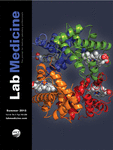
LABORATORY MEDICINE
Fostering excellence in laboratory diagnostics and research.LABORATORY MEDICINE, published by Oxford University Press, is a pivotal journal in the fields of biochemistry and clinical biochemistry, officially indexed under ISSN 0007-5027 and E-ISSN 1943-7730. Since its inception in 1973, it has provided a vital platform for the dissemination of high-quality research, facilitating scholarly communication and innovation in laboratory diagnostics and biochemistry practices. The journal is classified in the Q3 quartile for medical biochemistry and Q4 for clinical biochemistry, reflecting its commitment to enhancing the scientific community's understanding of laboratory science. With its quarterly publications and rigorous peer-review process, LABORATORY MEDICINE serves as an essential resource for researchers, professionals, and students alike, offering insights into the latest developments and methodologies in the field. As a part of a rapidly evolving discipline, the journal is not only dedicated to publishing original research but also aims to present reviews, case studies, and expert opinions that contribute to the advancement of laboratory medicine. In a global context, it emerges as a significant player, prioritizing accessibility, though currently maintaining a subscription-based model, facilitating informed research and clinical application.

JOURNAL OF BIOMEDICAL SCIENCE
Leading the way in biomedical research and collaboration.JOURNAL OF BIOMEDICAL SCIENCE, published by BMC, is a premier Open Access journal dedicated to the rapid dissemination of research in the fields of biomedical science, encompassing crucial areas such as biochemistry, cell biology, clinical biochemistry, and more. Since its inception in 1993, the journal has established itself as a leading publication, currently boasting a remarkable impact factor and quality as evidenced by its Q1 quartile rankings across multiple categories in 2023. With an impressive track record, including a Scopus ranking in the top percentiles across several disciplines, it serves as a vital resource for researchers, professionals, and students who are keen on advancing their knowledge in biomedicine. The journal operates under a fully Open Access model, ensuring that all published articles are freely available to the global research community, thus contributing to the broader dissemination and accessibility of scientific knowledge. Based in the United Kingdom, JOURNAL OF BIOMEDICAL SCIENCE is committed to fostering innovation and collaboration in research, appealing to those aiming to make impactful contributions to the biomedical sphere.
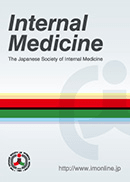
Internal Medicine
Fostering Excellence in Medical ScholarshipInternal Medicine is a distinguished peer-reviewed journal published by the Japan Society of Internal Medicine, focusing on the nuanced field of internal medicine. Since its inception in 1974 and with a commitment to advancing medical knowledge, the journal has evolved remarkably, aiming to disseminate high-quality research that contributes to the understanding and treatment of internal diseases. Operating from Tokyo, Japan, it provides an intellectual platform for researchers and clinicians to publish original articles, reviews, and case studies that address various aspects of internal medicine. The journal currently holds a ranking in the Q3 quartile for both Internal Medicine and miscellaneous Medicine categories as of 2023, signifying its growing influence in the medical community. Although not an open-access journal, it remains accessible to a wide audience through institutional subscriptions, enhancing its reach among professionals and students alike. With its commitment to excellence, Internal Medicine serves as an essential resource for those seeking the latest developments and research within this vital medical field.